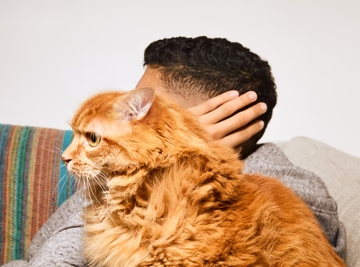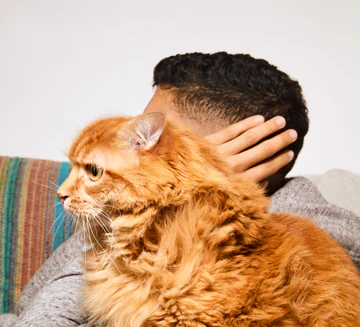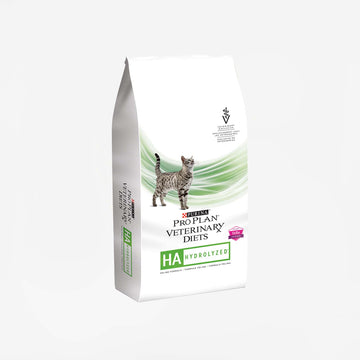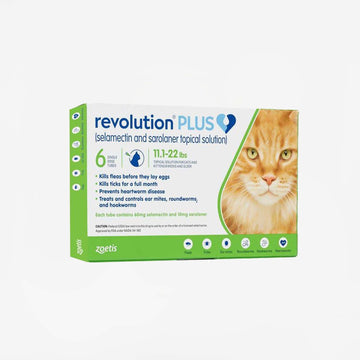Ease your cat's vomiting & stomach issues from home
Connect with a vet today to get treatment and a prescription with a 10-minute video call.

- Unlimited vet visits and follow-ups
- Prescriptions delivered free to you
- 100% licensed veterinarians

Causes and treatment for cat vomiting
Learn why cats throw up and what to do about it.


Hairballs
Hairballs
Cats regularly groom themselves by licking their fur, which they can then swallow. Over time, undigested hair can stick together in the stomach and form a lump, which will then be vomited up. Hairballs are generally no reason to be concerned. However, if your cat spits up hairballs daily, or grooms excessively, this could be a sign of some other condition.
Allergies
Allergies
Allergies, especially food allergies, are a major cause of vomiting in cats. Common food allergies include beef, dairy, chicken, and fish. If your cat regularly throws up after eating, they may be allergic to something in their food. Environmental allergies may also cause vomiting.
Parasites
Parasites
Gastrointestinal parasites, including tapeworms, roundworms, and hookworms, often cause cats to vomit and have diarrhea. Worms are common in cats, especially younger cats and kittens, those that interact with other cats, and those that spend a significant amount of time outdoors.
Eating too fast or something inapproriate
Eating too fast or something inapproriate
Cats that eat too quickly may regurgitate their food shortly after eating. In this case, you may notice their vomit is shaped like a tube and the food looks undigested. If your cat regularly regurgitates their food, a Dutch vet can offer suggestions on how to get them to slow down.
If your cat eats a foreign object (like hair ties, rubber bands, or strings), it can get lodged in their intestines, causing them to throw up. Curious cats may also eat things like human medication, toxic plants, or poison left for pests that can lead to vomiting. Both of these situations can be extremely dangerous and life-threatening, so be sure to take them to a veterinarian immediately.
Illnesses and anxiety
Illnesses and anxiety
A number of illnesses can cause cats to vomit — from a virus or stomach bug to more serious causes, like cancer, kidney or liver failure, digestive system disease (gastroenteritis), pancreatitis, hyperthyroidism, and nervous system disorders. Anxiety and stress may also lead to vomiting.
How Dutch works
-
Pick a plan and become a member
-
Schedule a video call with a licensed vet
-
Order the prescriptions the vet recommends
Frequently asked questions
What can I use Dutch for?
What can I use Dutch for?
With Dutch, you’re never alone when it comes to your pet’s health. Whether your pet needs care or you just have a question, our compassionate and knowledgeable vets are always happy to help.
Here are some ways you can use Dutch:
- Care & prescriptions for over 150 issues
- Behavioral health, nutrition, and exercise advice
- Puppy, kitten, and new pet parent advice
- Preventive care plans
- Night and weekend vet care
- Second opinions & follow-up care after in-person visits
- Advice on whether you need to go to the ER or urgent care
- Vet care when you’re traveling
- Easy prescription refills
- Longevity treatment plans
- Answers to non-urgent questions
What is a visit with Dutch like?
What is a visit with Dutch like?
When booking a video call with a vet, you'll be asked a few questions about your pet’s health issue. Depending on the issue, you may also be asked to fill out a longer questionnaire about their symptoms and share photographs of them so our veterinarians can better understand what’s going on. You’ll then pick an appointment time that works best for you.
During your video call, one of our licensed veterinarians will talk to you about the symptoms your pet is experiencing, ask you questions, review your pet’s medical history if you’ve provided it, and answer any questions you have. The vet will ask to see your pet and their environment. And they may ask you to perform some simple checks on them if needed.
After your video call, the vet will send you a message with a custom treatment plan to help your pet feel better, including a link to buy any recommended prescription or over-the-counter medications. Place your order and we’ll ship it free.
How do I know if you can treat my pet?
How do I know if you can treat my pet?
Our vets can provide care and prescriptions for more than 150 issues — and over 90% of cases can be treated virtually.
The vet can diagnose your pet based on your description of their symptoms, their medical history, seeing them during your video call, and, if needed, through uploaded photos and videos. They may ask you to do a few simple checks during the call. We also offer a number of at-home lab test kits for dogs and cats.
The health and safety of pets is our top priority. In the rare case that a vet determines a pet needs to go to a local clinic, they’ll provide a referral and offer advice on how to care for them until they can be seen.
Some things that require in-person care include emergencies, wounds that need stitches, and issues that require blood work, imaging (X-rays or ultrasounds), or surgery.
Our vets are always available for second opinions and follow-up care after in-person vet visits — so you don’t have to navigate health issues alone.
How much will it cost for Dutch to treat my pet?
How much will it cost for Dutch to treat my pet?
Our memberships are designed to make your pet’s care as easy and affordable as possible. Here’s how your costs will break down:
Membership: You can choose to pay the total price upfront or in 4 installments. All memberships include unlimited care for up to 5 pets at no extra cost.
Vet calls and messaging: No cost — video chat and message with vets as often as you need for free.
Medication: The price will vary depending on your pet’s needs. To keep your costs down, we offer a price-match guarantee, free standard shipping, $25 off your first product order, and 20% off your first flea & tick order.




